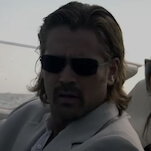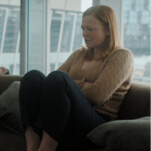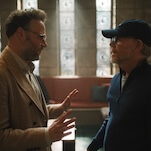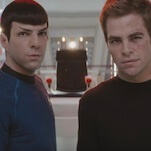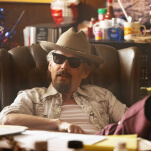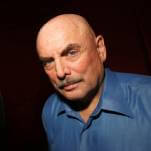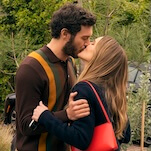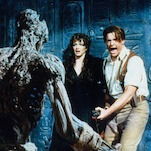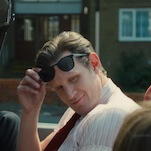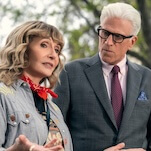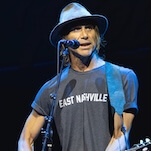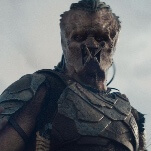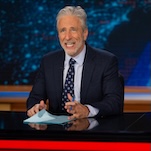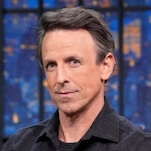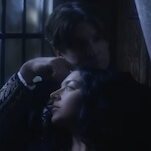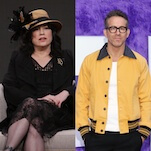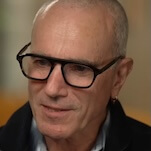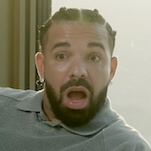He walks in, we say hi, and then we go up to my room and he said to me, “I’ve been to this hotel before.” And I said, “Okay.” He goes, “But when I checked in I had a plan, I didn’t intend to check out.” He said that was the first time he’d been back and that he thought it was good that I was there and that he had talked with his therapist about it. He thought I was a good person to be there with him, I don’t know what you’d call it, revisiting. There had to be serious, emotional feelings about returning to the scene of his attempted suicide. So we sat and we talked about that off-mic for a bit, for about a half hour or so. I let him process what he was going to process there. Kind of held the space a bit. I said, “What do you want to do? Do you want to talk about this or not?” He goes, “I don’t know, I don’t know if I can. I don’t know if I’m ready.” So we just had the first interview, and we talked for an hour with no mention of it whatsoever. We talked about his childhood, about The Onion, whatever that first part is. And I waited for him to cue me, if he wanted to go into it and it didn’t happen.
I shut the mics off. I said that was great. And I said, “If you feel it would help you or it would help others to talk about that event candidly, publicly, we can do that. So why don’t you put some thought into it? I’m not going to post this for a while anyway, I’ll sit on this, and I’ll be back eventually. So think about it.” A bit of time went by, I don’t really know how long. In my mind it must have been a couple months. I got in touch with him—I can’t remember if he got in touch with me or I got in touch with him—but he said, “Okay, I want to do that, I’m ready to do that.” And next time I was there in Brooklyn, I went over to his house, and then you got that second part, which is him walking me through the feelings that led to that day and the events of that day and his feelings now about that day and the impact it had on him and others and how it changed him. And that’s how that unfolded.
AVC: Did it seem like he was in a better place emotionally, that he was better prepared to revisit something that had to be psychologically very staggering?
MM: He definitely did. He seemed like he was in a better place. He’d obviously been getting help and doing everything he can to stay in a groove to keep it level and keep it light with his friends and with himself. So, by the time I talked to him the second time, he had some perspective and had taken some responsibility for what the implications of his actions were. I got home with that file, and I sent it to him and said, “Sit with this for however long you want, and make sure you’re okay with it.” And I think he did for at least a month or two. I wanted him to have the opportunity to go through whatever feelings he was going to have, whether they were chemical or genuinely emotional feelings about that conversation and make sure he was okay with putting that out in the world. But the thing is, when you’re dealing with someone with that type of depression, however he seemed in that second conversation, you are still hearing a person who is wrestling with something very actively without any sense of it being cured or handled completely. So whenever you are talking about that kind of stuff, you never feel like someone is out of the woods completely. I felt like he put that event in perspective and definitely we saw a lot of things. And I think that the possibility of him doing that again, at that juncture, is significantly less. It seems like he’s moved and relieved by the honesty of it all, but you don’t think, “Yeah, he’s all better.”
AVC: I think a big part of the reason why it’s such an incredibly powerful episode, is there isn’t a sense of distance. There isn’t detachment. It’s so present. You really get a sense of childlike openness and vulnerability. Did you get that talking to him in person? Like that you were talking to a man reborn in many ways?
MM: Yes. There was definitely that feeling that he had woken up. When you go that deep and that dark and you’re that alone mentally, you know that selfishness is required to carry that out. This blindness to anything other than yourself is profound. And it came to me that what he had come into through some relief was how important other people were to him, how important his cats were to him, the effect it had on others. And how he was almost born again, emotionally connected, and able to access feelings and have empathy for what he put others through.
AVC: Could you relate to that kind of hopelessness and despair?
MM: Yeah, a bit. I think I’m more of a drama queen than a depressive. I certainly identified him with my father, and I definitely had my own thoughts about it. But to attempt suicide and mean it is not something I believe is within me. My darkness only goes so deep. And his attempt was a warning to others, in a strange sort of way. It’s a warning to those who are on the precipice of doing that or living with thoughts of doing that.
You know, when they changed the type of natural gas that they were using for ovens nationally in England, the suicide rate went down. They found out that if you’re not around something that is going to make it easy for you to commit suicide, you might get through that moment, you know what I mean? Applying that logic to him, if you are in that moment and there is really no easy way to do it, it might pass. There’s a real good chance it will pass. But clearly Todd has put a lot of planning in to it. He meant business, and there are people who mean business. What for me was profound was to be able to show up for a guy and hear him and hold that space for him to be comfortable enough to do that. It was one of the first times as an interviewer I became very aware that I didn’t need to talk over anything that was uncomfortable or try to move on. In that second interview I really just shut up and opened my mind and my heart to what he was going through, and I didn’t feel this discomfort to interrupt. So that was a big lesson.
AVC: Is that something that has gotten easier with time, picking your moments and reacting as opposed to being more aggressive?
MM: Yeah. You figure that out.
AVC: WTF has become known as a podcast where people can be more confessional, where they can really reveal themselves. This episode is a great example of that. What is it about your podcast that makes people feel safe enough to be vulnerable in a way that they aren’t in other places?
MM: Some people come with those expectations, but before we get off the track of Todd, the amazing thing about that episode is that hundreds and hundreds of emails came in, primarily from people who had either tried suicide, but it was more than that. This was an amazing moment where I realized that people were getting something out of the show that I could never have imagined, that the show was being of service in a way. I got a lot of emails from people who had family members or friends or husbands or wives or lovers who had killed themselves and they could not understand why. They could not wrap their brain around why someone would do that. And somehow or another, Todd was able to explain that in a way that they heard and they were grateful for. He eased that type of anger that aggravated furious grieving and guilt of people connected emotionally to suicide victims. That’s a profound thing. And also the people that tried to kill themselves and didn’t and those living in that kind of depression, them finding relief and emailing us about it. It was a great feeling. I sent a lot of those over to Todd. I think it really validated his choice to share his story.
AVC: Were you at all surprised by the outpouring of support, by the fact that it touched such a deep vein in people’s lives?
MM: Yeah, I was surprised by all of it. I’m always touched and surprised by what this show seems to mean to people. I’m constantly surprised and grateful and humbled by the whole thing. In answering your other question, I don’t really know. I never set out to do some sort of confessional show. There was no agenda to WTF. I think that with the podcast, a few episodes set a tone. Some people, if they listen to it and they gear up for it and they think that they have to do that, it’s okay, but I’m more than willing to talk about and stay really wherever the interview subject wants to stay. Ultimately they’re going to dictate what’s going to happen. If I sense I shouldn’t continue with this line of questioning or maybe it’s uncomfortable, it’s very delicate to decide if somebody wants to. It’s really them volunteering the information and just my nature. I like to talk to people about things, I think. It feels good to me. It feels real for me. There are been plenty of interviews that didn’t go there. I don’t know what’s going to happen. I come with my own baggage, but I’ve also become a better listener. You sit in a garage surrounded by garbage and books and things, and I really won’t let any of these be less than an hour long. So if you ground the conversation in the moment and have an authentic conversation, if you talk for an hour, somewhere in that hour, somewhere halfway or two-thirds of the way through, shit can get really pretty real, just by nature of the tone of it and the space and the fact that there are no cameras around and I am generally intently focused on what people are saying.
AVC: In your mind, what were the episodes that established the tone of what WTF was going to be?
MM: Outside of the ones that we’re talking about here?
AVC: Yes.
MM: I think that the Robin Williams episode was fairly astounding to a lot of people. I knew he was capable of being very sweet and almost shy. But I didn’t know that he would talk as candidly as he did to me. I think that episode, in terms of showing or exploring or actually being present for someone who is a very public person and someone who is notoriously manic and elusive by virtue of bombastic improvisations and riffs, to hear him speak so quietly and candidly about his heart attack, about his drug rehabs, about divorce, about depression, and about stealing jokes was, I think, something that was just never imagined, quite frankly. [Laughs.] To deal with it in a relatively unfunny way. So I think that that set the tone. But coming at Robin and being in his home, it being 11 in the morning with no lighting or cameras, it just being him and I, him knowing enough about me and me knowing enough about him, and his sort of recently getting back into sobriety, he was in a place where he wanted to talk.
I don’t know what he thought about it. I think he was happy with it. I get random phone calls from him once or twice a year for no reason. I never know how to respond to phone calls from people of that stature. I generally don’t call back. But the only reason I’m bringing that up is that I think he felt good about it or he wouldn’t be talking to me at all. I think that episode was publicly a mind-blower. The [Carlos] Mencia episode, within my community of people who love comedy, I think was an important couple of episodes, and also very telling about what makes an episode of my show good. Maybe out of my own weird honesty about my resentment and heaviness and insecurity and my need to connect and share things, I think when my show is good, it has the ability to humanize people who are for the most part publicly one-dimensional; the only way you can take them in is through mainstream media. So when you see somebody as a full person, or a person with flaws or a person that has an inner light that completely contradicts your assumptions or your understanding of them as a public personality, it’s a profound thing. It’s also something that makes these guests be much more relatable, to the point where people can now see themselves as having more struggles or being more forgiving of that person or feeling guilty for pigeonholing them.
It engages a lot of human emotions around individuals from people listening that they wouldn’t have assumed were possible. Because I was such a dick to Dane Cook, people were aggravated. I’d get emails from people like, “I didn’t even like Dane, but I do now because you were an asshole to him.”
AVC: You thought you were a dick to Dane Cook?
MM: No. I was a little cranky that day for other reasons. I didn’t know how to handle it. It was one of those things that I wanted to do, he wanted to do it, but I didn’t know how to approach it. I didn’t want to just sit there and, say, do the standard line, so I kind of pressed it. But he was also really well prepared. Some people have a public personality that is capable of depth. I don’t know that I really got to a place where he was unguarded at all, but he was able to talk about things. I don’t know that I was a dick to him. I might have been a little standoffish for whatever reason. But that episode was not as big a turning point. The Mencia episode, the Robin episode, the Louis [C.K.] episode, [Zach] Galifianakis, for other reasons, just in terms of putting it on the map. But there have been so many episodes.
AVC: Would the Gallagher episode be one of them?
MM: Yeah, but for a different reason. That episode became infamous. I don’t know that that was a great episode. It definitely brought attention to the show. But I didn’t want it to go that way. I felt bad that we couldn’t work through it, whatever the hell happened there. I felt a little responsible for not being as diplomatic as I could have been to get a little more out of him. But I also thought he overreacted. But I got a lot of flak for that. I got a lot of flak for being a lefty douchebag. I got flak for not respecting him. I got flak for politicizing the conversation, for whatever. But I also got a lot of support. I think the novelty of that moment being recorded and put out in the world was very intimate and very bizarre. And, “Aw, come on Gallagher???” became sort of a catchphrase.
AVC: To a certain extent, it seemed like a generational thing, where he wasn’t used to being in an arena where people are expected to be more open and not just be their public image.
MM: Some of these performers have psychological issues. These aren’t always choices. I think he’s just a problematic personality. In terms of who he is and who he thinks he is and what he thinks he knows… I ain’t going to cure that. Especially if they’re not aware of that. I just think he thought he was walking into some sandbagging, and I had walked into an ego that was expansive beyond anything I had ever encountered, and it just got a little intense.
AVC: Rightly or not, it seems like some people listen to the show to hear you mix it up with a guest. How do you feel about that?
MM: I don’t really know. I don’t want to nail anybody. I feel that certain things with certain people need to be talked about. The Mencia episode is a great example. When I did that episode, it was really just to talk to a guy who was carrying a burden of being vilified by the entire community and armies of people that followed other comics and the narrative, but I knew nothing about it. I wasn’t hanging around The Comedy Store. I’m not really a catty person. I don’t really have my ear to the ground in any way. I barely watch television. I don’t talk to a lot of people about other people, so I was way out of the loop. So here I was just trying to talk to a guy that I knew was on an HBO special the same time I was, and had been doing comedy for a long time. I wanted to get a sense of how he was handling this burden of being completely marginalized. [I was] only really familiar with the two more public incidents of stealing and didn’t know how epidemic it was in terms of the accusations and how pathological it seemed. I do this first interview and I realize very quickly that I’m being used as a means to remedy his personality problem publicly. I knew within five minutes of him being on the show that he was being political in terms of his own reputation. That he wanted to fix his reputation. The narrative that he was presenting me with was very deliberate and very constructed, and I was not going to be able to get in, within, or under the narrative he was presenting.
After it was over, I was frustrated and I didn’t think I could release it, but I made the mistake to tweet that I was talking to him, so the expectation was very high and I had this hour that didn’t even address anything that was relevant or important to the people that were wondering whether he was going to address these issues. 1) I didn’t know the issues. 2) I just couldn’t get through his bullshit. So I was in this weird position where I talked to some people and I interviewed someone who knew him years ago and I interviewed somebody who toured with him fairly recently and just basically functioned as character witnesses. They were not out to indict him. I wasn’t trying to indict him. There’s a couple people I called that didn’t want to be brought into that mess. Then I had to call Carlos back and say, “Look, I talked Willie [Barcena], I talked to Steve [Trevino], and we just didn’t address things that need to be addressed. I can’t put out the episode without us having another conversation.” Then he was like, “I’ll come over now.” I didn’t know what that meant. I was literally frightened. I didn’t know if he was going to come over with friends. I really was nervous about it because I set out to deal with my own shit and talk to people, not to be forced into a journalistic position.
[pagebreak]
AVC: You’re not the comedy cop.
MM: No. I’m not. I actually, instinctively would rather that not existed, but I understand how it’s important. But no, I’m not that guy. If you’re going to be an arbiter or the judge, I’d rather just talk to people about trying to get at it in a human way. I don’t want to be a standard-bearer. Because we’re all faulty. It’s a weird thing. But apparently the crimes of this guy were much deeper than I thought, so I had to get him back in and confront him on it. What was interesting about that second episode was that he doesn’t admit to it, but the way he danced around it certainly was very revealing about his mind and his personality. It was troubling. So what listeners can glean from that, being confronted with the questions and putting stuff together, was a full picture of this guy’s issues. And I think it’s pretty clear who that guy is, but by doing that second interview and by him… I tried to end that interview twice and he just kept going. You really get a good sense of who he is, and I think that enables people to put him in a different perspective.
Episodes #111, 112: “Louis C.K. Part One/Louis C.K. Part Two” (October 4 & 7, 2010)
MM: Louis and I have known each other forever, since the late ’80s anyway. Not unlike with Todd, Louis and I had a very strange, instinctual connection to each other for whatever reason. He wrestled with things. I wrestled with things. But there was always a shorthand there. When we hung out together, it was always good. We got laughs. We talked about a little shit. For many years. There’s a lot of resentment from very early on and jealousy on my part that I could not translate my humor as well as he could translate his. When I first moved to New York, he was already working and making a lot of money and I was wandering around being miserable. The tricky thing about the dynamic is that we were always sort of friends, but again, not unlike many comics, we didn’t maintain the friendship; we didn’t nurture it or anything. He’d call me, I’d listen to him, and generally he was there for me. It was random and not often when we didn’t live in different places, but usually when we’d chat for a couple hours we were able to connect in a very real way. I’m not sure he has a tremendous amount of people he spends time with, and I don’t either, so it was always fun. He always made me feel better, and I think we did that for each other.
It just got weird. It got weird to the point where I started to feel like he had a list of people he called when he needed help of some kind, and that it was a very one-sided friendship. So I just said, “Fuck it. I can’t really talk to you anymore. I got too much of my own shit going on, and I just feel like it’s one-sided.” That was that.
But I didn’t really realize that I was the one that did that until I talked to him. [Laughs.] When we talked, over the arc of the podcast, there’s a significant amount of personal growth for me. When I started it, I was miserable and at the end of my rope and depressed and broke and twice divorced and in a lot of emotional, psychological trouble. This really functioned for me to reconnect with the community and reconnect with people I’ve known and also to talk honestly with people and feel the joy and help that comes from connecting with people. We’re designed to handle the full range of human problems. We just avoid it, most of us. So I became addicted to connecting with people, sitting down for an hour, on a personal level. I think that the reason the podcast became interesting was really, in retrospect, that I was doing for personal reasons. It was not to create entertainment. It was not to make money. It was not to build an audience. I really needed to talk to people.
When I finally talked to Louis, I had really opened my heart and allowed myself to feel the heartbreak of where that relationship had gone and also the heartbreak of my own jealousy and what that had done and just really push myself to appreciate and to respect and celebrate my friend’s brilliance. And that was a hard thing for me to do. When I went into that interview with Louis, not unlike many of the interviews, I don’t draw from a lot of research. I just draw from my own feelings, my own experiences with them personally or my thoughts of them or whatever.
AVC: Is there a philosophy behind that or is it just an instinctive thing?
MM: I just would rather err on the side of having real conversations. People who are public people develop over time a personal narrative. So I’m either going to have a conversation or engage them in their narrative. I’d rather talk to J Mascis about skiing than I would about Dinosaur Jr., because once in conversation, you’re going to get a sense of who that guy is, and in the other conversation you’re going to get information about who they are. They’re different things.
It evolved into a philosophy. It was not a philosophy initially. And I’ll do a bit of both if I have to, if I don’t know the person or I’m not as interested as I could be in a person. Yeah, I definitely should know whether or not they won an Oscar.
But with Louis, I had realized that I was with him at very specific junctures in his life, early on. I put a lot of thought into Louis. Despite whatever jealousy I had ever had, I always very unabashedly said, out of anybody I know, he’d be the only one capable of an act of real genius because of his freedom of mind and his ability to fully commit to things that people would really just go, “Why would I do that? Why would I write a script about a woman with a beard?” Who would do that? A genius would do that. Because they don’t have the same second-guessing elements.
So entering that conversation, really I just wanted to go over the moments that we had together that I think were defining to him, whether he knew it or not. Because he’s got a lot of Louis in his head. And there were definitely these moments and they turned out to be a very nice journey for that first part of the interview that we experienced together. That wasn’t really done for me to integrate myself into his life, for him to thank me or to realize what good friends we were. I really thought that the moment that we found that fucking VHS of Putney Swope was a game changer for his brain. And it was. It was that personal experience that drove all that. Then once we got into the nitty gritty of our friendship and him calling me out, it was hard for me to take because my instinct is to go, “But you… But you… But you… You did this. But you did this, too. Remember that.” But why do that? Hear him out. If it’s true, then own it and don’t get petty. So that’s where those moments come. Why I think that second part about friendship was so powerful is because I heard it and I took it seriously. Him talking about his kids, that was a surprise. I think it was a surprise to him. Certainly a surprise to me. But after doing these interviews, I’m capable of being there for that without destroying that moment.
AVC: One of the things that’s really appealing about the podcast is the evident pleasure you take in your guests, the pleasure you take in people and ideas and reconnecting.
MM: It was something that I really lost touch with. I’m very thrilled that it’s back. As a kid, my sense of self was fragile. From a very young age I always gravitated to charismatic people who I thought were profoundly interesting. This is going back to when I was 10 or 11 years old or even younger, hanging around my grandfather’s hardware store where these old guys that would sit there all day and would just talk. And then meeting people in my life who I thought were just—maybe it was a looking for a father figure or something, I was always compelled to sit as an audience around people that I thought were engaging and funny. I loved it. It was really one of the best things, also about being a comic early on, you just sit around these guys that were hilarious and great storytellers. At some point, I had just closed off all of that. I got too bitter, and I was not enjoying the company of people. I was threatened by it. Over the course of doing the podcast and also getting some validation around the podcast, I felt that I achieved something and that I was doing something good. It made me feel good about myself. That cured me of a lot of insecurity and a lot of bitterness and opened me back up to the joy of laughing and listening to fucking people tell great stories. The back and forth of that. It was just a great thing that happened.
AVC: Do you think it’s coincidental that you and Louis broke out around the same time?
MM: I think without argument his was much more of a breakout. But…
AVC: Don’t underestimate yourself. You’ve both become these huge figures pretty much at the exact same time and both with this kind of autonomy, this whole new way of thinking about comedy.
MM: One of the things we share is a deep stubbornness; with him, through his experiences with a lot of big opportunities that have pushed him into taking charge of his own destiny, and with me it was more a desperation thing. I didn’t have much leverage or traction at all. Louis has got more of a warrior sensibility. He’s very proficient at many things and could have had a very lucrative career in show business no matter what he did. But for him to realize and have enough traction to decide his own momentum and that bold move he took with FX and how he was going to do his show and them allowing that to happen definitely speaks to a hardened visionary sensibility. I don’t know if I’d give myself that same attribute. I think I’ve always been stubborn and also, I really don’t know how to do it any other way than how I do it. It was more finding a place where that would be received and it just so happens that that place was in conversation with other people. But it’s helped a lot of things.
We share a stubbornness about how we put ourselves out in the world, but definitely a different series of events brought us to this place.
AVC: On some level, WTF seems like a way for you to understand yourself and your past. That definitely seems to have been an undercurrent in the Louis episode, where he’s obviously been very important to you in the past and your histories are intertwined.
MM: Yeah, I don’t know if it’s clear from the podcast, but I developed strangely deep emotional connections to people in my life that I may be just a passing character to them. I don’t know what that is. I don’t know why that is. I can have one encounter with somebody and feel connected to them and read a lot into that. They become very important people to me, but to them I may just be like, “Oh yeah, we talked that one time, right?” But it could have changed my life somehow. The thing with Louis and the thing with the podcast was that I explore those connections because a lot of time I assume a connection that isn’t there or I assume that I understand somebody in a certain way.
I’ll start the conversation with those moments where I ask, “I remember this about you and it was a weird bit of business, but I was there. I don’t know if you know that, but I was there.” The reason I remember stuff over other things is that it had a profound effect on me. There were quite a few of those with Louis. In lieu of a maintained relationship or friendship, I have these moments, these events that happen with that person that has kept me connected to that person in my heart and mind for years. But they were really just an afternoon.
Episode #219: “Norm Macdonald” (October 17, 2011)
MM: Louis was white-hot and profoundly culturally relevant. Because of his success at that time, that episode becomes a launching point to sort of portal into a cultural narrative about Louis. Whereas with Norm… I don’t know, we can try to figure out why it is, but after I interviewed Norm, I called my partner and said, “We’ve got to put this up immediately.” I was overwhelmed with excitement about the Norm Macdonald episode. I think that is a profoundly signature WTF episode, because going into it I had this one weird memory of Norm in a hotel room with Caroline Rhea watching his first Letterman with him facedown on the bed unable to watch it. But outside of that memory from the late ’80s, my experience with Norm was no different than anyone else’s. I saw him on television. I’d see him occasionally. Always seemed kind of sardonic and not very talkative. I had heard things about gambling and drinking and this and that over the years, but I didn’t know Norm, and when I got the opportunity to interview him, I was excited because I was not only a big Norm fan, but I grew to appreciate his sense of humor and have a great deal of respect for him. But I didn’t know him at all. And I was genuinely concerned that I wouldn’t be able to have a conversation with him. Just by his public personality and the times I met him I thought, “I don’t know if this guy can even talk for very long.” You know what I mean? He doesn’t seem like a talker.
So it was one of these episodes where I was heading into it going, “What the fuck. How is this going to go? Am I going to be able to talk to him? I don’t know anything about sports. What am I going to do in there?” I was racking my brains and completely nervous. Then he showed up, and all of a sudden this whole other person that I couldn’t have ever imagined was inside of there. All of my assumptions about him were wrong. My fears were not necessary. We had a lot in common, and for whatever reason, I’m talking to a very sensitive, self-aware, struggling, searching, intelligent person about one of my favorite books. He brings up [Ernest Becker’s] The Denial Of Death, and that’s a seminal book for me. He talks about religion. He talked about his gambling problem. I had no idea. It was just one of the greatest conversations I ever had in the garage because I was completely wrong. My perception about somebody was just way off. It turned out to be one of the greatest conversations I had there, and I couldn’t believe it. I’m jumping up and down and saying, “We’ve got to get this thing up now. We can’t wait like we usually do,” as if this was the most important interview of the decade. He didn’t have anything to plug. He wasn’t selling anything. He just came over and did this thing and it was just great. I think that’s the sort of best example of a show where I’m surprised and excited and the conversation goes someplace I never thought it would go. It’s fucking deep.
AVC: It seems like one of the primary joys of WTF for you is realizing that people are not who you expected them to be.
MM: Yeah! It’s great! People are people, and we all have these similar struggles. I just can’t even express how amazing it is, how many creative people get in touch with me about their process and about finding kindred spirits in people they respect and have given them a lot of comfort in their own process. The amount of art this show seems to inspire is amazing. It’s just those kind of episodes where it’s revelatory and it’s unfolding before my eyes and your ears. We’re having this conversation with somebody none of us knew and we all thought we did.
AVC: It seems like one of the key moments in your life was meeting with Lorne Michaels about being on Saturday Night Live.
MM: Yeah.
AVC: That represented something for you about the establishment, about the way you were perceived, and that was around the time that Norm Macdonald was the anchor on “Weekend Update,” was it not?
MM: Yeah, I was told by an evil journalist that I was just being used to get him to re-up.
AVC: Did talking to Macdonald give you a different perspective on that whole experience?
MM: It did. Being a flying-by-the-seat-of-my-pants, reactionary kind of person and not really understanding that politics plays into every hierarchy or every bureaucratic endeavor, yeah. I don’t know that he gave me much clarity. He said that that probably wasn’t the case, if I recall correctly the episode. That event is one of those events that it was really just a half an hour or 45 minutes of my life that ripples, continues to ripple…
AVC: And plays over and over again in your mind.
MM: Yeah, but not in a bad way. I found it very fascinating and it was very electrifying, but I’m not sure I could have handled the job at that point in my life. But nonetheless, there is that event. I imagine if you were to ask Lorne Michaels about it, I’m sure I was just one of hundreds of people who sat there and listened to him talk. I’m sure I had no impact on him whatsoever. But the idea that he went out of his way to screw me… I don’t know that that’s out of character either. I’ve sort of built him into this mythic thing, and I’ve gotten no one to really begin to puncture that myth in any little way. Everybody I talk to always finds something good to say about him. Who knows, maybe one day I’ll talk to him. The best and worst thing that could happen is he has no recollection of the meeting, and even when I recount it for him he’ll just sort of dismissively say, “That sounds like something I would say.”
AVC: Do you think you might be asked to host Saturday Night Live at some point?
MM: Nah. I don’t think so. Why would I?
AVC: I don’t know. Louis just hosted.
MM: Look, Louis is a big star. I’m still just a guy that’s working for a living. But certainly I appreciate that you think that’s a possibility.
